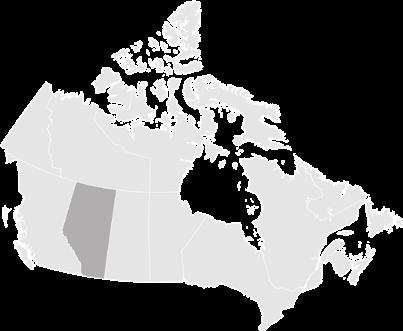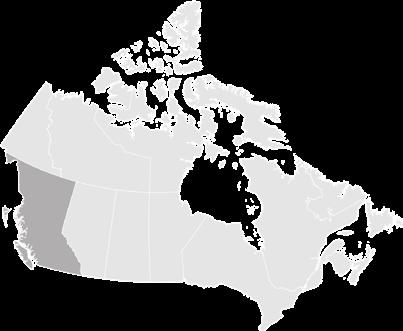
4 minute read
Part 5. The Francophone Community in Saskatchewan
Sociodemographic and health profile
• In 2016, Saskatchewan’s Francophone population was estimated at 14,440, a decrease of 56% from 32,550 in 1971.
Advertisement
• The demographic weight of this community falls seriously to 1.3% from 3.5% in 1971.
• The aging of the population is very pronounced in Saskatchewan and, in particular, among Francophones, whose median age is 55.2 years. Seniors aged 65 and over are estimated at 29%, the highest level in French Canada.
• Saskatoon and Regina are home to almost half of the province’s Francophone population.
• 10% of the Francophone population reported a First Nations identity, and 24% of the Francophone population are international Francophone immigrants.
• Francophones in Saskatchewan have a lower level of education than the average for Francophones outside Quebec, but their employment income is slightly higher than the average for Francophones in the rest of Canada outside Quebec. Despite the latter fact, the amount of government transfers is among the highest.
• 93% of Francophones are satisfied with life, but only 59% perceive their health as good or excellent; 17% report fairly high life stress and 86% have good or full functional health.
• Some health indicators for Francophones, such as physical activity and certain chronic health conditions such as diabetes and hypertension, could be improved; they register higher values than for the general population.
• In 2017, the prevalence of dementia in Saskatchewan, including Alzheimer’s disease, was 5.46% for the total population aged 65 and over. This is the lowest rate in Canada after Newfoundland and Labrador (Public Health Agency, Infobase 2022).
Services and gaps
• The province does not have a provincial dementia strategy or action plan. However, provincial stakeholders such as the Alzheimer Society are calling for tools to increase awareness and prevention of the disease in the province.
• Some support services for people with dementia and their caregivers such as the Saskatchewan Aids to Independent Living (SAIL) program exist, and some additional measures were announced during the conduct of this study.
• Until 2020, Saskatchewan did not have a legal framework for the provision of Frenchlanguage services. Since 2022, guidelines have been formulated and the position of Official Languages Champion has been created in the province.
• Since then, efforts have been made more systematically to translate documents, of which those concerning the elderly are a priority.
• Further efforts are being made regarding training in active offer and the development of a language- identification registry for professionals. An interpreter-accompaniment service supports French-speaking users who have to navigate the health system.
• Gaps were identified in home care, particularly for rural and remote areas, where the aging Francophone population is concentrated.
• Other gaps include the lack of bilingual residences or beds for French-speaking patients and the absence of bilingual staff in these facilities, which results in the isolation of Frenchspeaking residents.
• The community sector responds to the needs of the Francophone senior community by offering programs and activities for seniors and their family caregivers. On the one hand, these organizations promote the prevention of cognitive disorders among seniors through physical, social and recreational activities. On the other hand, they contribute to the wellbeing of family caregivers and raise awareness among authorities and the general public about the importance of their role.
Survey
• Sixty-three Francophones in Saskatchewan participated in the survey (22% of the total).
• These participants have a good knowledge of the problems related to cognitive disorders, including dementia.
• They consider that the three most important challenges experienced by people with cognitive impairment/dementia and their relatives are: not recognizing the early signs of the disease; the loss of autonomy; and thirdly, in equal measure, the loss of the affected person’s abilities and the feeling of being excluded from social activities.
• The top three resources they look for to learn about cognitive impairment and dementia are: information in general, information on prevention and information on nonpharmacological approaches.
• The preferred sources of information are those available on the Internet and presentations and advice given by health professionals.
• The majority of Francophones in Saskatchewan usually look for resources or services in both official languages; however, they find them mostly in English.
• However, they attach great importance to receiving care services, support for the caregiver and the person being cared for, and information on prevention in French
• To improve their knowledge, the first three protective factors they would like to know more about are, in order of importance: adopting a balanced diet, maintaining cognitive activity, and thirdly, in equal measure, maintaining a social network and practising artistic activities.
• To reduce the risk of developing dementia, they would like to learn more about sleep disorders, chronic depression, sensory and hearing loss and cardiovascular health. Cigarette smoking and alcohol consumption are only a priority for two out of three French speakers.
• If funding were available, Francophones in Saskatchewan would give priority to services that would offer support and assistance.
Taking action in Saskatchewan
• The following courses of action are based on interviews with resource persons and family caregivers. They also take into account the results of the survey and could help improve certain services:
Prevention and awareness
• Develop measures focused on protective factors aimed at improving healthy lifestyle habits, particularly those identified by survey participants (adopting a balanced diet, maintaining cognitive activity, maintaining a social network and engaging in artistic activities).
• Include information and prevention activities, non-pharmacological approaches, resources mentioned in the survey.
• Focus on modifiable risk factors for dementia, concentrating on those prioritized by survey participants (sleep problems, cardiovascular health and sensory and hearing loss).
• Promote, through prevention and awarenessraising activities, the importance of early detection and the services available in general and in French in particular.
• Review the feasibility of setting up an assessment, diagnosis, guidance and consultation service, in French, as suggested by the Francophone survey participants.
• Develop municipal and provincial awareness campaigns to foster inclusive environments.
• Develop tools to make communities inclusive of people with dementia (kits, age-friendly communities and others).
• Increase funding to Francophone community organizations so they can better serve Francophones in remote areas and strengthen funding to community organizations that support family caregivers.
Training
• Better equip doctors to diagnose both dementia and its precise type early.
• Raise awareness among nursing staff in longterm care facilities.
• Developing the language skills of nursing staff in long-term care facilities.
• Promote, for training and information dissemination, the sources most often consulted by the Francophone community.
Health care
• Strengthen health services in both official languages for people with dementia.
• Provide more home-based services, particularly in small Francophone communities.
• Promote the recruitment of male home-care attendants.
Support for family caregivers
• Offer adapted services to reduce the responsibility of family caregivers and make what already exists (support groups,
Alzheimer Society meetings, therapeutic support, others) more widely accessible.
• Encourage disclosure of dementia diagnosis as a strategy to counteract stigma.
• Value and recognize the role of family caregivers by appropriate means.








